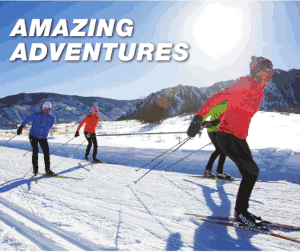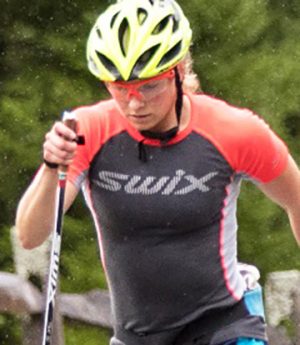Please tell us how you were named as the new Head Coach for Canada’s XC Ski Team?
Justin Wadsworth: I was contacted after the Olympics in Vancouver to discuss a position with the Canadian organization. After quite a long period of discussion, the head coach position started to emerge as one of the options, which I was very excited about.
What are the most important points of your agenda for CCC?
JW: Building a true team, which functions well and has great support not only for the athletes, but for the staff and technical team as well. The key to this is good communication, and an open forward thinking group of individuals. Of course, this is all in place for my real agenda, which is having our athletes winning ski races.
Have you chosen your staff yet?
JW: Eric de Nys is our National Development Team coach, who will play a major supporting role on World Cup this year. Yves Biladeau will be heading our waxing staff, which will build on continuing commitment from the same core group that has been with the team for the last few years. The rest of our support team is in the final stages of being put together, but I can tell you it’s a really professional and motivated group.
How do you feel and what’s your current state of mind considering these big changes in your life?
JW: I’m still really excited to be working with this team. It’s been some weeks now, and I still get out of bed fired up to do all I can for this organization.
Can you reflect on your own experience with the USST at Vancouver 2010 in Whistler?
JW: It was an exciting time of course, and we as a team fought hard the whole games. Were the results all we wanted? With the exception of Kikkan [Randall] they were not close to what we wanted, but after the Games the athletes showed that the fitness was there by being on the podium twice.
What do you think are the most important attributes you bring to this new job, and will you do things differently than previous coaches with the team?
JW: I bring good communication skills, and I have the athlete in mind with everything I do. My experience with sprinting is something that will add to not just the sprinters on our team, but to the distance skiers as well. So many of the mass start races now come to a sprint finish, and all members of our team still need improvement here.
You have been blessed with having the formation of a world class team – what are your current marching orders?
JW: This whole team knows we’re close to great things, but we can’t rest on the success at the Games in Vancouver. We need to continue to look for new ways to be better, and work extra hard in the areas where there is room for improvement.
What’s your racing schedule like for the coming winter?
JW: Our two main goals for the year are the Nordic World Championships and the Tour de Ski. We plan to be at all the World Cups except Russia with a team of one form or another.
You’re known for your humanistic and open approach, are you ready to handle the pot shots that will came as part of the job?
JW: As long as I’m staying focused on the task at hand, and making good decisions I’ll be able to live with the pot shots. I’ll try to improve in the areas where I make mistakes, and I’ll remember that there are many people out there with nothing better to do than to make anonymous negative comments on websites that serve no purpose.
USSA is a large multi-sport organization with many different needs. How do you see the difference working with an organization like CCC which has a more singular focus?
JW: That’s really part of the excitement of this job – everyone in the organization is all about cross-country skiing and working towards putting our athletes on top. It’s been very refreshing so far.
You have been vocal about the issue of doping in sport. Recently [Floyd] Landis brought dramatic attention to it again in the world of cycling. Do you think we’re making any progress and were you ready for the reaction from some quarters last winter?
JW: I think there’s some progress with cleaning up the sport. Russia seems to be moving in the right direction, especially since their athletes are becoming more vocal, but the proof will be in the pudding. As far as the reaction last year, I knew going into the Games that the media would be looking for things to write about, and I knew doping was still an issue, so with the help of a few coaches from different countries we made some noise. It wasn’t much, but if we keep the pressure on, and get more teams willing to speak out, then we might make a difference.
Is FIS at the center of this issue, as far as testing, controls or sanctions?
JW: Yes, they sometimes try to pass the buck to WADA, but FIS is the organization in control of carrying out testing on the World Cup, and following up with target testing in the off season. They’re talking big now about sanctioning Russia, but so far it’s all just talk.
You have very close Canadian ties with Beckie, do you think there’s any difference in coaching attitudes or the mileau from one nation to the other?
JW: Perhaps the only difference is you feel like you have more support from the country itself because of the government funding in Canada, and the importance of winter sports across the country. We also have some major team sponsors that are super excited about our sport which is great, but knowing that the government is backing us as well is a good feeling.
For sure in the US there are great supporters of cross-country skiing, but up North it just seems like everyone on the street is behind the team to a certain extent.
Thanks for taking some time and all the best this season.
JW: Thank you.





![National camp action [P]...](https://skitrax.com/wp-content/uploads/2019/08/Duluth-4-2019-08-08-at-10.46.51-AM-300x246.png)
![Matt Liebsch on the CXC Elite Team [P] CXC...](https://skitrax.com/wp-content/uploads/2019/08/Matt-Liebsch-CXC.2-525x700.4-300x267.jpg)
![Dan LaBlanc [P]...](https://skitrax.com/wp-content/uploads/2019/08/Dan-LaBlanc-img_1855.3.jpg)

![Justin Wadsworth [P] Pam Doyle](http://skitrax.com/wp-content/uploads/2010/06/USCoachJustin.2.2-200x147.jpg)